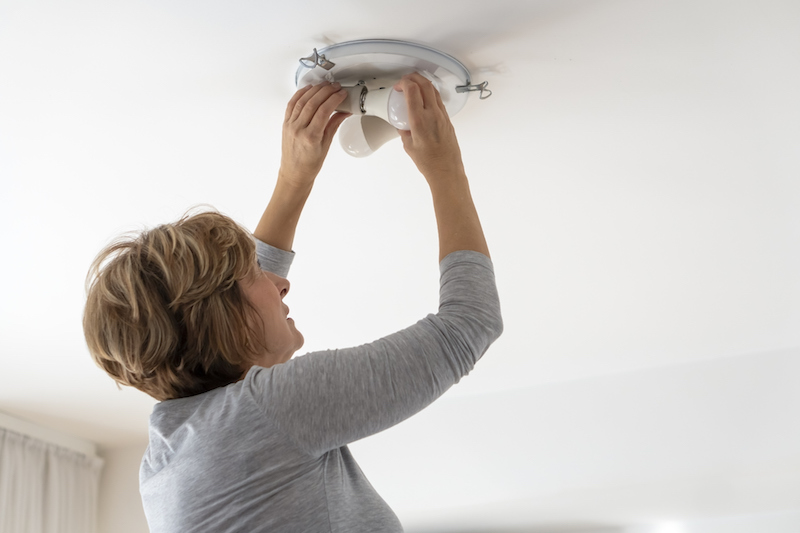For some, senior home maintenance can become more of an obstacle course than a simple routine of repair, replace and restore. Climbing a ladder to change a light bulb becomes dangerous if there are issues with balance. Pushing a lawnmower, picking up a bag of garden soil, climbing stairs, cleaning the house, and bending, reaching and stretching to rake leaves can become increasingly challenging.
The older adult may be able to manage their other responsibilities independently, like paying bills, keeping appointments and managing their medications. They may engage in plenty of hobbies and activities, and enjoy a great social life. So, how does one simplify home maintenance for a senior who wants to live independently?
What Seniors Can Do
These are simple steps most older adults can take themselves to make their home safer and more comfortable:
- Get a humidifier. Place a humidifier in the bedroom where one sleeps. Humidifiers have many benefits for seniors. When used properly, humidifiers can help senior with chronic lung disease, ease breathing, and reduce congestion.
- Eliminate tripping hazards. Falls and the subsequent health issues that occur as a result of falling are the leading cause of injury and death in senior adults. Eliminate wrinkled rugs, make sure to clear obstructed walkways, use non-slip rugs, and place night lights in bedrooms and hallways to make walking from the bedroom to bathroom and back safer at night.
- Check windows and doors. Continually test to see if windows and doors are shutting and locking properly, and that hinges and knobs are tight. Secure and repair them, or seek help if more major repairs are needed.
- Install and maintain smoke and carbon monoxide detectors. Installation of these devices are a critical safety measure. However, it is recommended that they be installed on or near the ceilings of rooms. If ladders are a safety issue, seniors could enlist the help of family members. Also, some fire departments provide free installation of these devices for homeowners that qualify.
The AARP provides a HomeFit Guide (a free publication) with more than 100 tips and suggestions to help people live safely and comfortably.
Organizations, Resources, and Services
While older adults may be able to turn to family and friends to assist with senior home maintenance, there are other resources available.
There are many organizations and businesses that specialize in home maintenance for senior adults or that are familiar with people and organizations that can provide these services.
Agency on Aging. A senior’s local Agency on Aging can be a resource and starting point for seniors.
Community action agencies. These are local private or public non-profit organizations that provide a variety of resources to low-income people. The services provided by Community Action Agencies vary by organization. Most agencies rely heavily on volunteers to provide their services and programs.
Grants. Local city or county housing or community development departments may provide grants for home repair.
Low Income Home Energy Assistance Program (LIHEAP). A federal government program that assists eligible low-income households with their heating and cooling energy costs, bill payment assistance, energy crisis assistance, weatherization and energy-related home repairs.
Volunteer programs for free home repairs and modifications. Several national and local organizations provide free home repairs to vulnerable individuals or families. They help senior citizens as well as the disabled or very low-income families update and/or repair their home for safety and health reasons. They may also do basic work, such as lawn maintenance, painting, and similar activities.
Habitat for Humanity. Habitat for Humanity, a national organization of volunteers, has developed a plan for seniors wanting to remain in their homes called Housing Plus. A construction specialist from the local Habitat organization performs a home repair evaluation and then conducts a survey to discuss the senior’s needs within his or her home.
Volunteers from a charity or religious organization. Local religious or charitable organizations may provide volunteers to assist with home maintenance.
Rebuilding Together. The Safe at Home program provides no-cost preventive home modifications to people with mobility issues and other disabilities to improve accessibility, reduce falls, increase independence and facilitate aging-in-place. Safe at Home is designed to improve aging-in-place outcomes for low-income older adults through the modification of their home environment to meet their specific needs.
The U.S. Department of Energy’s Free Weather Assistance Program. This weatherization assistance program is administered at the state and local level. To find out if a person qualifies, he or she should contact the applicable state weatherization agency.
Contractors. Some building contractors are willing to perform home modifications for seniors at a reduced fee or on a sliding scale. Modification and repair funds provided by the Older Americans Act are distributed by Area Agencies on Aging.
Work can range from simple changes, like replacing door knobs with pull handles, to major structural projects such as installing a wheelchair ramp.
Make sure the contractor is licensed, bonded, and insured for the specific work to be performed. Check with the local Better Business Bureau and Chamber of Commerce to see if there have been any complaints against the contractor. Also check with family and neighbors for recommendations based on their experiences.
Ask for a written agreement that specifies the exact tasks and timeline. The agreement should also include the total estimated cost of the project, and require only a small down payment. The terms should also require that the balance of payment only be made when the work is completed.
The National Association of Home Builders offers a state-by-state directory of builders who are Certified Aging-In-Place Specialists. These certified builders and remodelers have training in the unique problems of home construction for aging and improving accessibility.
Lawn care services. When the yard work becomes too much, lawn care services are an option. Some things to consider before hiring a service:
- Are they licensed and insured?
- Will they perform the service without a contract?
- Will they provide a trial period before agreeing to a contract?
- Do friends and neighbors have experience with the contractor?
How is their customer service? The service may be better if the company has an office manager or owner-operator who will respond promptly and reasonably.
Handymen. There are many competent, honest handymen that perform good work at a fair price. But, as with any professional a senior brings into the home, you should research the service before hiring.
Recommendations from friends and family are probably the best source of reliable information. Also ask the handyman about the following:
- How long have they been in the business?
- Do they have photos of similar work?
- Have they worked with anyone in the area?
- What will be the cost and how long will the project take? (Get this in writing.)
- What is the individual price breakdown for the project?
- Can they provide references? (Call the references, but keep in mind they may have been supplied as references for a reason.)
Also, verify they have insurance and, though a deposit is often required, never pay for the entire project until it is completed. And keep in mind the best handyman to hire may not be the lowest bidder.
House cleaning services. Giving someone like a housekeeper extensive access to your home puts a premium on trustworthiness.
First, decide if you want a professional service or an individual. A professional service is more likely to consistently show up at the home as scheduled, but turnover may be high and you may not get the same crew every time.
With an individual you can build a more personal relationship and possibly negotiate additional services needed. And you, as the homeowner, may need to pay federal and state taxes, and carry workers’ compensation. Here are a few more tips before you hire:
- Get recommendations from family and friends
- Make a list of your needs in advance
- Schedule a meeting with your prospective house cleaner or service representative
- Spell out expectations, and do a room-by-room walk through of the home.
- Get a quote on cost
Make sure the individual or service is bonded and insured. Professional services should carry general liability insurance as well as workers’ compensation insurance. Ask for a copy of the certificate of coverage.
Many Ways to Stay Independent
So, if you are a senior who senses your home maintenance needs are beginning to exceed your ability to take care of them, there are plenty of people, organizations, and resources that can simplify your life and help you maintain your independence.
For more Senior Home Safety tips, check out our blog.
| Bethesda has a 133-year tradition of providing excellent senior living options, including independent living, assisted living, memory care, and skilled nursing. If you are considering independent living, we welcome you to tour one of our exceptional communities, including Bethesda Barclay House – Clayton, Bethesda Gardens – Kirkwood, Bethesda Orchard – Webster Groves, Bethesda Terrace – South County, Village North Retirement Community – Florissant, and The Oaks at Bethesda Villas – Kirkwood/Webster. Discover the level of care only a non-profit staffed by highly-trained nurses, therapists, and aids can offer. |
Want to find out more?
If you’d like to stay up to date with Bethesda Health Group, sign up here to receive our blog and newsletters!
"*" indicates required fields
Related Articles
Want to find out more?
If you’d like to stay up to date with Bethesda Health Group, sign up here to receive our blog and newsletters!
"*" indicates required fields



